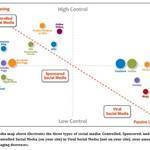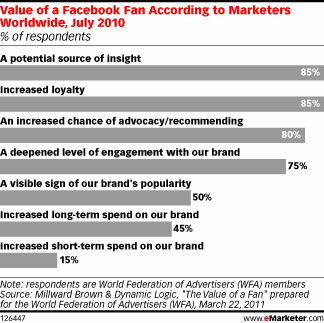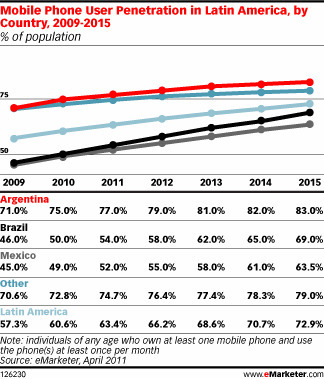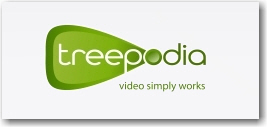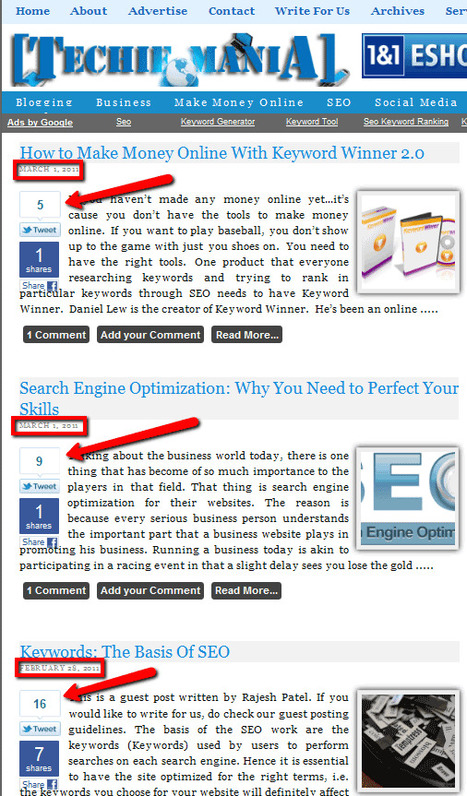If search engines -- such as Yandex in Russia -- are generating their search query algorithms automatically using machine learning, does that mean we need a re-think of SEO practices? What is machine learning in this context and how does it work?
Follow, research and publish the best content
Get Started for FREE
Sign up with Facebook Sign up with X
I don't have a Facebook or a X account
Already have an account: Login

Internet Marketing Strategy 2.0
179.6K views |
+9 today
Follow
Filter by date
Tags
Bottom-up, consumer-centered online marketing strategy news
Curated by
Robin Good
 Your new post is loading... Your new post is loading...
 Your new post is loading... Your new post is loading...
While video advertising has established itself as an effective channel, brands continue to search for ways to improve engagement and conversion.
Remember when I said real-time video ad buying was the future.
The disconnect between interest graph and social graph will progressively affect our experience with Facebook in two ways.
First, we feel spammed when brands pollute our news feed by posting too much content (as shown by the survey I mentioned above). Over time, this creates an information overload feeling not so much because the content is not interesting than because it prevents us from accessing the real cool stuff shared by our friends that we signed up for: pictures, news, videos, fun stuff, etc... The fact Facebook users have started to unlike pages shows that this limitation is already at work.
Many organic campaigns start out with high expectations. There is clear focus and intent on working head keywords to drive traffic and begin branding efforts.
However every seasoned SEO knows that with a focused plan, heads will eventually turn to tails. Remain pertinacious, and the the tail will continue to grow and ultimately result in what is known as the long-tail keyword phenomena – a converting machine. Definition and History of the Long-Tail Keyword The long-tail keyword is simply a combination of multiple words (usually 3 or more), that are specific and relevant to a product or service sold. In essence, long tails are considerably more definitive and often times used to refine the search process by the visitor.
Earlier, we reported that webmasters were finding signs indicating the Panda update may have been launched in more countries.
From
adage
It seems like there's a new Facebook-related headline every week, as the industry debates the social network's worth, its necessity, and its value as an advertising venue.
Late last year it was revealed that one out of every four online display ads in the U.S. was shown on Facebook. That news came on top of data showing that 50% of all Facebook users log in daily. The industry is still struggling to understand exactly what Facebook is, but few have noted the channel it most closely resembles: television.
Here are the five critical reasons marketing agencies must transform now, based on our recent survey:
Social media has little direct impact on most website traffic, according to a new report released today from ForeSee Results.
Less than 1 percent of website visits, on average, come directly from a social media URL. The findings indicate that the direct impact of social media is minimal, but also that the true value of social media cannot be measured only by examining the traffic coming directly from a social media URL.
By now, if you work in the digital arena, you’ve most likely taken a glimpse at Facebook Insights. After all, many people have responsibility for managing online communities, like Facebook, and need to track metrics and report back to management on a semi-regular basis.
Admittedly, Facebook doesn’t offer the most comprehensive suite of data out there. In fact, some folks have figured out work-arounds to install Google Analytics on their Facebook page for more in-depth information. But, Insights actually probably serves most brands just fine. It provides basic data that can tell you a lot about if and how you’re fairing on the platform.
eMarketer helps companies understand the internet by publishing internet market research, statistics and objective analysis on internet marketing, internet advertising, online trends and online demographics.
With the rapid rise of crowdsourcing over the last five years since the term was coined by Jeff Howe in Wired, there has been a lot of coverage on how individuals, organizations and businesses can implement the concept into their work.
Last year there was a new conference (CrowdConf), a new consortium (Crowdsortium) and a myriad of companies that offered sites, tools and platforms to get more out of the Internet masses. But what about the worker? Since crowdsourcing is making such a visible impact on the way work is done, how can professionals and creatives benefit from the crowdsourcing model? Here are 18 ideas for participating on crowdsourcing sites for perks, prizes, and, yes, even income.
As mobile penetration and usage increase across the board, marketers must craft campaigns that appeal to local communities and cultural differences. Ads developed for the US or other Western markets may not have the same impact throughout the world.
Latin America, as a region, has some of the highest adoption rates of mobile devices in the world and overall mobile phone user penetration of 55.4%. eMarketer estimates that penetration in Argentina, Brazil and Mexico will be 77%, 54% and 52% in 2011, respectively. Due to multiple SIM cards per person, subscription penetration in the countries is estimated much higher. |
The 2010 online advertising industry numbers posted by the Interactive Advertising Bureau this month showcased an impressive increase in US online ad spending for the year.
Search marketing remained the largest ad spending contributor, its share down slightly to 46% of all US internet advertising dollars. Display advertising, which includes banner ads, rich media, video and sponsorships, increased its share, accounting for 38% of US online ad spending in 2010, up from 35.2% in 2009.
Direct Marketing News has a great write up about Paintball-Online.com. Paintball-Online.com is, as you might suspect, an e-commerce website selling paintball and paintball-related products.
And in case you’ve never run across a paintballer or played yourself, allow me to tell you that these are some of the most passionate hobbyists around. And they love buying new gear. You may not believe this is possible, but Paintball-Online.com carries over 5,000 different paintball products. Paintball is big business. Here’s a shot of their home page:
Social video marketing isn’t only about creating entirely positive new experiences for customers. Sometimes it involves demonstrating responsibility when you make mistakes, and how you make amends.
I feature some video apology examples of Domino’s Pizza from both their national headquarters and a local franchisee owner; and also some tips on how doing your own video apology can be successful in your own business.
Hello Hubbers, I’m Thomas, and I work for the AdSense team in Dublin, Ireland and today I’d like to talk to you guys about how to drive quality traffic to your Hubs so you can increase your AdSense ads click-through-rate (CTR), and earn more money.
From your emails, there were a lot of questions related to getting more traffic to your Hubs as well as improving the search ranking of your posts. We’ll go over four different topics today that can help you tackle both those issues.
With Google looking more at social media these days, in terms of ranking signals, a lot of webmasters continue to wonder how Google treats URL-shorteners in terms of SEO.
This isn’t completely new information, but it still seems to be a topic that continues to come up fairly regularly. Google’s Matt Cutts addressed the issue in a video posted to Google’s Webmaster Help YouTube channel. “Custom URL shorteners are essentially just like any other redirects,” he explains. “If we try to crawl a page, and we see a 301 or permanent redirect, which pretty much all well-behaved URL shorteners (like bit.ly or goo.gl) will do, if we see that 301 then that will pass PageRank to the final destination.”
I had the good fortune to spend an afternoon at the offices of Chicago based graphic t-shirt printer Threadless recently and their story is one that I never get tired of telling.
When it comes to SEO, Google’s PageRank (PR), which is the most used SEO ranking metric, is vague and unhelpful.
Although most SEOs would agree that it’s an indication of a page’s popularity (or power), it’s unclear why that’s so or exactly how popular a ranked website is. For example, for a website with a PR of 7 — and as a point of reference, this website has a PR of 6 — most people would assume it’s a popular, and thus powerful, website.
Find out through this great set of comic illustrations
“Look at her: so beautiful, so friendly, so smart. And what a personality. She must be mine. Hooking up with her would make me the envy of all my friends. Sure, she’s young and she’s gorgeous. Besides, I can easily try something new if I get bored or something better comes along.”
No, that’s not an excerpt from Lolita. As cruel and inappropriate as they might seem, these thoughts are fairly common in our society. In fact, in the past year, millions of people have entered into exactly that type of relationship. Don’t bother calling the Special Victims Unit; what we’re discussing here is not what you think it is. It’s the Apple iPad. Apple seems to have entranced people. It’s hard to walk down the street without passing someone who is plugged in to those iconic white headphones or to enter a coffee shop without hearing someone gabbing on their iPhone. Apple’s stores are crowded, and its products sell in absurd quantities. Why is this? Apple might be a visionary company with a strong grasp of what’s hip. Yet I believe Apple’s appeal lies in something more than trends, something deeply ingrained in our psyche: relationships.
2011 is going to be a big year for payments, with more startups and mature companies getting funded in the space than almost ever before.
It’s important to make the distinction between the headline chasers, the slow moving giants struggling for a piece of the pie and the companies that have a chance at real disruption. For my money Facebook and Square are both very interesting companies to follow in this space.
Google continues to introduce new sources of social signals at a rapid rate. The newest signal is the +1 button, a signal that some are calling their answer to Facebook.
Well, maybe, but I think there is much more to it than that. This is also Google's latest move to reshape their ranking algorithms. If we go back to the dawn of the modern search engine era, Larry Page and Sergey Brin's thesis became the basis of the first successful commercial search engine based on citation analysis. The form of the citation worked beautifully, it was links.
At the Web 2.0 Expo in San Francisco, Huffington Post and Buzzfeed co-founder Jonah Peretti detailed his philosophy on viral content. After years of testing how and why things to go viral, Peretti decided that the key is “thinking of content and media as an excuse for social action.”
Simply, stuff that has the best opportunity to spread is stuff that people want to share with others. If this sounds incredibly intuitive, that’s because it is. The way Peretti highlights this is through differentiating the two internet giants, Google and Facebook. The world view of Google, he says, is that media is about pure content. They value access to information such as “How do I get rid of my slice” and “What temperature do I cook a Turkey.” This is much different from the Facebook world view. For Facebook, media is a way to show the world who you are – to put yourself out there in a favorable way. It is “a way to do something with your friends,” says Peretti. He says that on Facebook, people like to share things that define them. Sharing a FAIL picture has little informational value to Google, but in the Facebook model, it is something to be shared with friends for a laugh. Guess which model wins out? |











